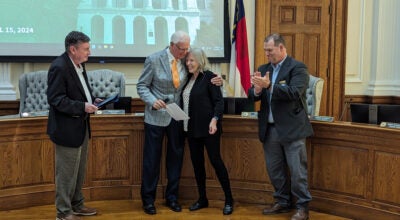Final day of City Council retreat gives staff, Council time to choose priorities
Published 12:00 am Friday, March 23, 2018
SALISBURY — By the end of their 2018 retreat, Salisbury City Council members and city staff members had three main focuses — economic development, community development and youth opportunities.
Those three categories encompassed everything that they had focused on for the last six hours of the retreat, including the Bell Tower Park project, a minority and small business angel fund, and a more formal relationship between the City Council and Rowan-Salisbury Schools.
Planning Director Janet Gapen and Downtown Salisbury Inc. Director Larissa Harper were given the chance to update the council on the downtown projects that are underway.
Gapen said the O.O. Rufty’s building, the Empire Hotel project and the redevelopment at the corner of South Lee and East Innes streets are just a few of them.
Harper mentioned that Railway Crossfit had moved to South Main Street and that it now occupies a large part of window space between Bank and Horah streets.
“They’ve almost changed that whole block by moving and being so visible there,” Harper said.
Robertson Foundation Executive Director Jason Walser talked briefly about the Bell Tower Green project, which will create a green space bounded by West Innes, South Church, West Fisher and South Jackson streets.
The space was originally purchased by the Blanche and Julian Robertson Foundation, but it was transferred to a nonprofit organization called Bell Tower Green Inc. last July.
Walser is on the board of that group and said its goal is to eventually give the park to the city.
“So even though we’re a nonprofit, we feel like we’re very much a partner with the city, with DSI, with the (Convention and Visitors Bureau.) We’ve been in contact with all of them,” Walser said.
Walser said plans for the park are 90 percent complete and that construction will likely begin this summer.
Councilwoman Tamara Sheffield asked about sidewalk improvements and pointed out that several people said “walkability” is important to them during Wednesday’s “visioning” process.
“I have yet to see anyone walk on the sidewalk from here (West End Plaza) to Statesville (Boulevard.) But yet I can be at somebody’s house in a neighborhood and I’ve got to walk on the road or in the yard,” Sheffield said.
Preston Mitchell, the city’s development and code services manager, said the city is currently divided into nine districts and that money is being “pooled” in certain districts that don’t need funding as frequently.
He said he’d soon be asking the City Council to approve an amendment to a land development ordinance that could free up money for those parts of town that are “hotspots of need.”
The minority and small business angel fund is an idea that Councilman David Post said he has been thinking about and working on for years.
“Great ideas for businesses are terrific, but if you don’t have any money, it’s a great idea and you can put it in an envelope and put it in the top drawer of your desk,” Post said. “Businesses need money.”
He said the biggest problem businesses that need money have is that when they go to a bank, the bank carries all the risk for that investment.
“So if it fails, the lender or the investor, they lose 100 percent of whatever the money is,” Post said.
Post said his idea would allow the city to put money into an “angel fund,” but only in cases where other investors decide to contribute.
He said the fund would ideally be about $500,000 and would have 10 contributors to it, including the city.
“That means that if a company wants, say, $100, instead of … one person losing $100, everyone only loses $10,” Post said.
Post said potential business owners could only apply for funds if they have “real, honest-to-goodness” business plans.
Mayor Al Heggins said she loved the idea. City Manager Lane Bailey said other cities are doing similar things and their models could be referenced.
Councilwoman Karen Alexander suggested the Rowan IDEA Center could be used to jump-start Post’s idea.
Near the end of the meeting, the discussion turned to education and youth opportunities. Councilman Brian Miller said education is “foundational.”
“It’s one thing we do not have any power or authority over. The fact that we lend support to try to help our local schools, Mr. Bailey reminds us often that he knows of no other community in the state of North Carolina that is doing this,” Miller said.
But Miller said he wants to work with the school system more.
“There’s no liaison relationship. You know, we have this partnership, but that’s it,” Miller said.
Miller then brought up the idea of forming a committee that would “advocate for Salisbury city educational goals and objectives” with the school board.
“That can include Pre-K discussions. That can include how we’re going to address charter (schools.) It can include all kinds of different things, but we first have to have the relationship,” Miller said.
Heggins said that might cause “pushback,” since the school board is responsible for the entire county.
The council members will pick up many of the discussions they had during the retreat at the annual budget meeting, which will be held in the next few months.
Contact reporter Jessica Coates at 704-797-4222.




